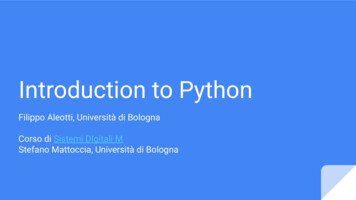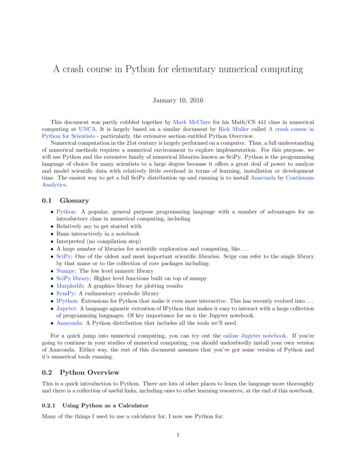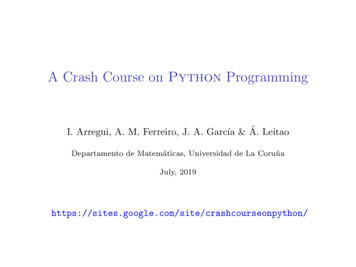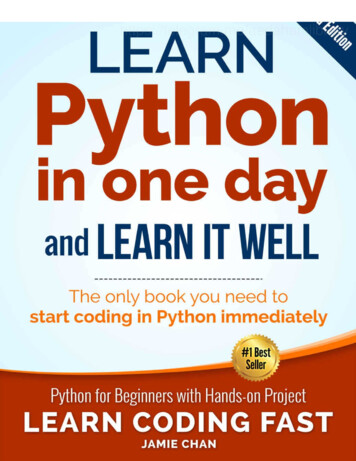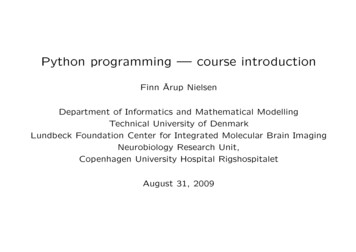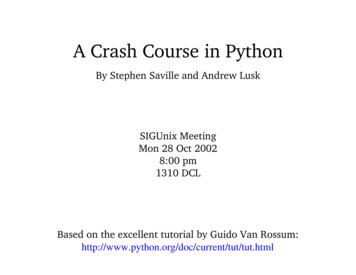
Transcription
A Crash Course in PythonBy Stephen Saville and Andrew LuskSIGUnix MeetingMon 28 Oct 20028:00 pm1310 DCLBased on the excellent tutorial by Guido Van tml
A Crash Course in PythonSigUNIX/Stephen Saville and Andrew LuskHow to Start PythonInteractive:bash# python print "Hello World"Hello World From File:bash#printEOFbash#Hellobash#28 Oct 2002cat EOF myfile.py"Hello World\n"python myfile.pyWorld1310 DCL
A Crash Course in PythonSigUNIX/Stephen Saville and Andrew LuskHow to Start PythonExecutable File:bash# cat EOF myfile.py#!/usr/bin/pythonprint "Hello World\n"EOFbash# chmod a x myfile.pybash# ./myfile.pyHello Worldbash#28 Oct 20021310 DCL
SigUNIX/Stephen Saville and Andrew LuskA Crash Course in PythonPython Data TypesNumbers:flt num 10.0Strings:my str "Dude, why are you using perl?"Lists:my list ("yo", 24, "blah", "go away")Tuples:my tup (1, 4, 32, "yoyo", ['fo', 'moog'])Dictionaries:my dict {'a': 24.5, 'mo': 'fo', 42: 'answer'}Objects:my inst MyClass('foo')Modules:import myfile28 Oct 2002int num 251310 DCL
A Crash Course in PythonSigUNIX/Stephen Saville and Andrew LuskNumbersIntegers: my int 4 my int/31Floating Point: my float 5.5 20/my float3.6363636363636362 0.5-0.10.40000000000000002Complex Numbers: 4 3j(4 3j) - 3j(4 0j) my complex complex(10,3)28 Oct 20021310 DCL
A Crash Course in PythonSigUNIX/Stephen Saville and Andrew Lusk str "Hello, my friends, welcome to Python." str.upper()'HELLO, MY FRIENDS, WELCOME TO PYTHON.' str.index('my')7 str[0:5]'Hello' str " I hope you enjoy your stay."'Hello, my friends, welcome to Python. I hope youenjoy your stay' print str(5) " " str(3) " " str(3 5)5 3 8 str.count('e')4 len(str)3728 Oct 2002onelineStrings1310 DCL
SigUNIX/Stephen Saville and Andrew LuskA Crash Course in PythonEverything's an ObjectObject Attributes:str . index ('e')variable namedelimiterattribute argumentsAttribute Peeking with dir(): dir(str)['capitalize', 'center', 'count', 'encode','endswith', 'expandtabs', 'find', 'index', 'isalnum','isalpha', 'isdigit', 'islower', 'isspace','istitle', 'isupper', 'join', 'ljust', 'lower','lstrip', 'replace', 'rfind', 'rindex', 'rjust','rstrip', 'split', 'splitlines', 'startswith','strip', 'swapcase', 'title', 'translate', 'upper']28 Oct 20021310 DCL
A Crash Course in PythonSigUNIX/Stephen Saville and Andrew LuskLists lst ['3', 45, 'frogger', 2] lst[2]'frogger' del lst[2] lst['3', 45, 2] lst.append('help') lst['3', 45, 2, 'help']List [i])index(x)count(x)sort()reverse()28 Oct 2002–––––––––add x to the end of the listadd all items in sequence L to end of listinsert x at a position iremove first item equal to xremove item at position i or end of listreturn index of first item equal to xcount occurances of xsort the listreverse the list1310 DCL
SigUNIX/Stephen Saville and Andrew LuskA Crash Course in PythonTuples (sequences) tup (6, 7, 'forty-two', 'question?') tup[0]6 del tup[3]Traceback (most recent call last):File " stdin ", line 1, in ?TypeError: object doesn't support item deletion tup2 ((1,2,3),[4,5,6]); tup2((1, 2, 3), [4, 5, 6])Sequence Operations (s,t sequences):x in sx not in ss ts * n, n * ss[i]s[i:j]len(s)min(s)max(s)28 Oct 2002–––––––––test if s contains xtest if s does not contain xsequence concatenationn shallow copies of sith element of sslice of slength of s (number of elements)minimal element of smaximal element of s1310 DCL
SigUNIX/Stephen Saville and Andrew LuskA Crash Course in PythonSlicing up SequencesSlice Operator:sequence [ i : j ]sequence variable 0 8 (1, (0, (3, (6,28 Oct 2002startone past endseq (0, 1, 2, 3, 4, 5, 6, 7, 8)seq[0]seq[-1]seq[1:4]2, 3)seq[:3]1, 2)seq[3:]4, 5, 6, 7, 8)seq[-3:]7, 8)1310 DCL
A Crash Course in PythonSigUNIX/Stephen Saville and Andrew LuskDictionaries (mapping types) dict {42: 'forty-two', 'naomi': 'person'}, 3: [1,2]} dict[42]'forty-two' dict['namoi']'person' del dict[42]; dict{3: [1, 2], 'naomi': 'person'} dict.keys()[3, 'naomi']Mapping Operations Abridged (d mapping object):len(d) – number of items in dd[k] – item of d with key kd[k] x – associate key k with value xdel d[k] – delete item with key kk in d – test if d has an item with key kd.items() – a copy of the (key, value) pairs in dd.keys() – a copy of the list of keys in dd.values() – a copy of the list of values in d28 Oct 20021310 DCL
A Crash Course in PythonSigUNIX/Stephen Saville and Andrew LuskControl Flow StatementsIf Conditionals: x 2 if x 4:.print "x is so small\n". else:.print "x is big, yo!\n".x is so smallFor Loops: for x in [1,2]:.print x.12While Loops: while x 4: x . x428 Oct 20021310 DCL
A Crash Course in PythonSigUNIX/Stephen Saville and Andrew LuskIf Conditionalsif conditional1:statement1.statementnelif conditional2:statementselse:statements28 Oct 20021310 DCL
SigUNIX/Stephen Saville and Andrew LuskA Crash Course in PythonFor Statementsfor name in list:statement1statement2.statementnThe Range Function:range([start,]stop[,step])make a list of integers in the range [start, stop),progressing by step each time. range(2,8)[2, 3, 4, 5, 6, 7, 8 range(10,2,-2)[10, 8, 6, 4]28 Oct 20021310 DCL
A Crash Course in PythonSigUNIX/Stephen Saville and Andrew LuskWhile Loopswhile conditional:statement1statement2.statementn28 Oct 20021310 DCL
SigUNIX/Stephen Saville and Andrew LuskA Crash Course in PythonBreaking out of Loopsfrom random import randrangefor n in range(10):r randrange(0,10)if n r: continueif n r: breakprint nelse:print "wow, you are# get random int in [0,10)# skip iteration if n r# exit the loop if n rlucky!\n"if n 9:print "better luck next time\n"Break, Continue and Else:break – exit the loop immediatelycontinue – skip to next loop iterationelse – executed when a loop falls off the end28 Oct 20021310 DCL
A Crash Course in PythonSigUNIX/Stephen Saville and Andrew LuskPass into the Void# a big, long, infinte noopdef void(): passif a b: passfor n in range(10): passwhile 1: passclass Nada: passThe Pass Statement:pass – do nothing but fill a syntactic28 Oct 2002hole1310 DCL
A Crash Course in PythonSigUNIX/Stephen Saville and Andrew LuskFunctions def bar():.print "The QuuxBox if foobarred!". def baz():.print "No it's not!". def foo(fun):.fun(). foo(bar)The QuuxBox is foobarred! foo(baz)No it's not! def docfoo():."This foo is documented!"28 Oct 20021310 DCL
A Crash Course in PythonSigUNIX/Stephen Saville and Andrew LuskBasic Defdef name([arg1, arg2, .]):statement1.statementn[return [expression]]Returning Values:return [expression]exit the function, optionally returning the resultof expression to the one who invoketh the function28 Oct 20021310 DCL
A Crash Course in PythonSigUNIX/Stephen Saville and Andrew LuskFunction Namespacebullets 10;def fire():print "BANG!\n"bullets - 1# error – bullets not defineddef truefire():global bullets # make bullets globalprint "BANG!\n"bullets - 1# good – bullets is globalGlobal Variable Accessglobal name [.]tell python to interpret name as a global variable.Multiple names may be globalized by listing the allseparated by commas.28 Oct 20021310 DCL
A Crash Course in PythonSigUNIX/Stephen Saville and Andrew LuskThe Argument Listdef name(arg[ defval], ., [*arglist], [**kwdict]):function-bodyDefault Argumentsdef charIndex(string, char, start 0, len -1):if len 0: len len(string).Keyword ArgumentscharAt("MakeMyDay", "M", len 4)Extended Argument Listsdef arbitraryfun(foo, *arglist):.def keywordfun(foo, **kwdict):.28 Oct 20021310 DCL
SigUNIX/Stephen Saville and Andrew LuskA Crash Course in PythonLamba FormsFunction Objects . -2 12def subtractor(x, y): return x-ysub subtractoradd lambda(x, y): return x ysub(5, 7)add(5, 7)lambda arglist: expression28 Oct 20021310 DCL
SigUNIX/Stephen Saville and Andrew LuskA Crash Course in PythonModulesImporting Modules import sys print sys.version2.2.1 (#1, Oct 4 2002, 15:26:55)[GCC 3.2 (CRUX)] from math import * sin(pi/2)1.0The Import Statementimport modulefrom module import name[, .]from module import *from package import module28 Oct 20021310 DCL
A Crash Course in PythonSigUNIX/Stephen Saville and Andrew LuskStandard hon system variables, including argvgeneric system interface (cross-platform)generic filesystem interface (cross-platform)regular expressionstime query and conversionbasic floating-point math functions (C libm)Online Module x.html28 Oct 20021310 DCL
A Crash Course in PythonSigUNIX/Stephen Saville and Andrew LuskFunctional Programming (Lists)Filterdef positives(list):return filter(lambda x: return x 0, list)filter(function, sequence)return all items in sequence for which function is trueMapdef lookup(dict, kwlist):return map(lambda k: return dict[k], kwlist)map(function, sequence)return the result of function applied to all items insequence28 Oct 20021310 DCL
A Crash Course in PythonSigUNIX/Stephen Saville and Andrew LuskFunction Programming Contd.List Comprehensions [x**2 for x in range(10)][0, 1, 4, 9, 16, 25, 36, 49, 64, 81][expression for name in sequence [if conditional] .]Reducedef dot(a, b):if len(a) ! len(b):raise ValueError, "sequences have inequal lengths"prod [a[i]*b[i] for i in range(len(a))]return reduce(lamba x, y: return x y, prod)reduce(function, sequence)apply the binary function function to the first two itemsin the sequence, then on the result and the next item, .28 Oct 20021310 DCL
A Crash Course in PythonSigUNIX/Stephen Saville and Andrew LuskClassesclass Namespace(UserDict):def init (self, basedicts):self.basedicts basedictsdef getitem (self, key):if key in self.data:return self.data[key]for dict in basedicts:if key in dict:return dict[key]raise NameError, keydef contains (self, key):if key in self.data:return 1for dict in basedicts:if key in dict:return 1return 028 Oct 20021310 DCL
A Crash Course in PythonSigUNIX/Stephen Saville and Andrew LuskBasic Syntaxclass name(bases):statements28 Oct 20021310 DCL
SigUNIX/Stephen Saville and Andrew LuskA Crash Course in PythonClass Instancesclass Area:def init (self, x 0.0, y 0.0, w 0.0, h 0.0):self.x xself.y yself.w wself.h hdef pointIn(self, x, y):return self.x x self.x self.w && \self.y y self.y self.hdef move(self, dx, dy):self.x dxself.y dyinst Area(1.0, 1.0, 4.0, 4.0)Initializer Methodinit (self[, args])method called to initialize a new instance of the class.28 Oct 20021310 DCL
A Crash Course in PythonSigUNIX/Stephen Saville and Andrew LuskClass Inheritanceclass Rect(Area): passclass Circle(Area):def init (self, x 0.0, y 0.0, r 0.0):self.x xself.y yself.r rdef pointIn(self, x, y):return (x-self.x)**2 (y-self.y)**2 self.r**228 Oct 20021310 DCL
A Crash Course in Python SigUNIX/Stephen Saville and Andrew Lusk 28 Oct 2002 1310 DCL How to Start Python Interactive: bash# python print "Hello World" Hello World From File: bash# cat EOF myfile.py

